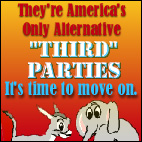|
|


Brief History of American "Third" Parties
Click here for detailed presidential election results, 1789-1996
- 1810-1830s: Anti-Mason Party (opposed to Masonic lodge and secret societies; William Wirt won seven electoral votes in the 1832 presidential election)

- 1820s:
Nullification Party (based in South Carolina, rejected federal supremacy)
Anti-Jackson Party (based in South Carolina, rejected federal supremacy)
- 1830-1850s: Liberty Party (anti-Slavery)
- 1848: Free-Soil Party (anti-Slavery in Southwest Territory; Martin Van Buren ran for president in 1848, John Hale ran in 1852; neither won any electoral votes)
- 1856: Republican Party (opposed expansion of slavery; John Fremont came in 2nd [to Buchanan] with 114 electoral votes, defeating - and ending - the Whig Party [see next entry])
- 1856: Know Nothing (Whig) (American) Party (opposed immigration and Roman Catholicism; Millard Fillmore won eight electoral votes)

- 1860: Constitutional Union Party (attempted to defuse slavery issue, avert civil war; John Bell won 39 electoral votes in the 1860 election)
- 1870-80: Greenback Party (advocated easy financial credit; James Weaver ran for president in 1880, but won no electoral votes; Weaver was more successful in 1892 as a Populist [see entry below])
- 1869-92: Prohibition Party (advocated alcohol prohibition, women's suffrage, free education, and prison reform; Clinton Fisk ran for president in 1888, John Bidwell ran in 1892; neither won any electoral votes)

- 1890-92: Populist Party (anti-industry [esp. railroads], unlimited silver coinage, and graduated income tax; James Weaver won 22 electoral votes in 1892) - more info -
- 1901-20: Socialist Party (Social Democrats and Social Labor moderates joined, advocated collective ownership of production & distribution; Eugene Debs ran for president in 1904, 1908, 1912, and 1920, and Allan Benson ran in 1916; neither ever won any electoral votes)
- 1912: Progressive ("Bull Moose") Party (progressive agenda; Teddy Roosevelt won 88 electoral votes)

- 1920: Farmer-Labor Party (socialist/progressive agenda; still exists as Minnesota's Democratic Farmer-Labor Party) - more info -
- 1924: Progressive Party (splintered from Bull Moose Progressives, running on anti-corporate monopoly platform, won farm and labor support; Robert M. LaFollette won 13 electoral votes)
- 1932: Socialist Party (Norman Thomas ran for president, but won no electoral votes)
- 1936: Union Party (William Lemke ran for president, but won no electoral votes)

- 1948: Progressive Party (Henry Wallace ran for president, but won no electoral votes, despite winning more than one million popular votes, and only 10,000 less than Thurmond, who won 39 electoral votes; this defeat ended the Progressive Party)
- 1948: States' Rights Democratic (Dixiecrat) Party (South split from Democrats, opposed to Truman's civil rights agenda; Strom Thurmond won 39 electoral votes)
- 1968: American Independent Party (George Wallace won 46 electoral votes)
- 1972: Libertarian Party (social liberalism, economic conservativism; John Hospers won one electoral vote)

- 1972: American Party (John G. Schmitz ran for president, but won no electoral votes)
- 1980: National Unity Party (John Anderson ran for president, but won no electoral votes)
- 1992-?: Reform Party (economic conservatism, apolitical; H. Ross Perot ran for president in 1992 and 1996, but won no electoral votes)

|











